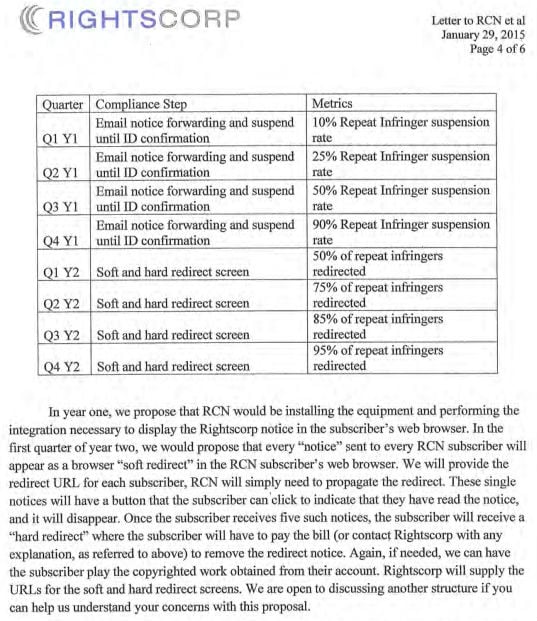Piracy monetization firm Rightscorp is promoting its browser hijacking system to ISPs. In a proposal revealed by Internet provider RCN, Rightscorp suggests a gradual approach where pirating subscribers eventually have to pay a fine to regain Internet access.
Source: TF, for the latest info on copyright, file-sharing, torrent sites and ANONYMOUS VPN services.
 Rightscorp has made plenty of headlines in recent years, often due its aggressive attempts to obtain settlements from allegedly pirating Internet users.
Rightscorp has made plenty of headlines in recent years, often due its aggressive attempts to obtain settlements from allegedly pirating Internet users.
Thus far these efforts haven’t been particularly successful. Rightscorp is reporting millions in losses and most major Internet providers are not forwarding their settlement demands, even when they are offered a cut of the proceeds.
In order to make their services more ‘appealing’ to ISPs the anti-piracy firm recently added a new strategy. In addition to sending in notices, it now offers ISPs a system where the browsers of subscribers are locked until they pay their ‘fine.’
We uncovered the browser hijacking plan before, but thanks to a letter made public by Internet provider RCN we can now see how Rightscorp promotes it to ISPs.
The letter detailing Rightscorp’s proposal was released by RCN this week, as part of the court case it started earlier this month. In the letter Rightscorp claims that it’s tracking tens of thousands of repeat infringers on RCN’s network, for which it sent over a million notices.
“Unfortunately, the problem on your network is massive and growing,” Rightscorp writes.
“It is our professional estimation that on an annual basis, there are still 95 million instances of songs, movies, TV shows, software applications and eBooks being distributed illegally on the RCN network annually without compensation to the owners,” they add.
The anti-piracy outfit says that in order to solve this issue and prevent further Government regulation, repeat infringements have to be properly warned. This means implementing a system where subscribers face serious consequences.
“In our opinion, the average RCN subscriber simply does not fear that there will be any consequences if they continue to engage in piracy.
“Rightscorp has a proven solution that has reduced repeat copyright infringers on ISPs that work with us. We see 374% less repeat infringement on ISPs that work with us versus ISPs that do not work with us,” the letter adds.
Instead of merely forwarding settlement demands, Rightscorp proposes a system where the ISP hijacks subscribers’ browsers. Initially, this would only affect 10% of infringers but the number would gradually increase to 90%.
The letter also contains details about the setup of the hijacking system, which works via a combination of soft and hard redirects.
Rightscorp’s proposal

The soft redirect will suspend Internet access until the subscribers acknowledge that they’ve read the notice. After five notices this switches to a hard redirect, which requires subscribers to pay up in order to browse the web again.
“These single notices will have a button that the subscriber can click to indicate that they have read the notice, and it will disappear,” Rightscorp explains.
“Once the subscriber receives five such notices, the subscriber will receive a ‘hard redirect’ where the subscriber will have to pay the bill to remove the redirect notice,” they add.
The letter is framed as a cooperation that can benefit both parties, but also applies some mild pressure here and there. For example, it closes by mentioning the devastating effect piracy can have on copyright holders and reminds the ISP of the major impact it can have.
“Without the browser hijacking, copyright holders have no option to stop piracy,” the company claims.
“Just one RCN subscriber with a 5Mbps upload speed running BitTorrent can give away 1.5 million MBps or 12,000 movies a year for free. We are tracking thousands of RCN subscribers doing exactly that every day.”
“Do you really want to stand by and do almost nothing while every American content creator is forced to have their work distributed worldwide for free on your network?” the letter asks.
We doubt that RCN is cheering on its pirating subscribers. However, the company also doesn’t appreciate being pressured into commercial partnerships with companies that have a dubious status.
Instead, it declined the offer and filed a lawsuit against music group BMG, one of Rightscorp’s major clients, describing the company’s piracy monitoring tools as flawed. Whether any other ISPs will take the bait will become apparent in the future.
Rightscorp’s full letter can be downloaded here (pdf).
Source: TF, for the latest info on copyright, file-sharing, torrent sites and ANONYMOUS VPN services.

 Fiber-To-The-Home (FTTH) kann billiger sein, räumt die Deutsche Telekom ein. Dies gelte für abgelegene Ortsteile, Weiler und Gehöfte. Vectoring wird zudem nicht staatlich gefördert. (
Fiber-To-The-Home (FTTH) kann billiger sein, räumt die Deutsche Telekom ein. Dies gelte für abgelegene Ortsteile, Weiler und Gehöfte. Vectoring wird zudem nicht staatlich gefördert. ( Founded half a decade ago, Swefilmer was Sweden’s most popular unauthorized streaming site.
Founded half a decade ago, Swefilmer was Sweden’s most popular unauthorized streaming site. Pampers mit Sensoren sind für den Procter & Gamble-Konzern eine Option. Zahnbürsten melden bereits, wenn der Nutzer zu stark drückt oder zu kurz putzt. (
Pampers mit Sensoren sind für den Procter & Gamble-Konzern eine Option. Zahnbürsten melden bereits, wenn der Nutzer zu stark drückt oder zu kurz putzt. ( Golem.de wollte von AVM wissen, welche Vorteile die Nutzer von der Abschaffung des Routerzwangs haben. Neben dem DVB-C-Tuner für das Streaming des TV-Programms auf mobile Geräte im WLAN wird noch mehr geboten. (
Golem.de wollte von AVM wissen, welche Vorteile die Nutzer von der Abschaffung des Routerzwangs haben. Neben dem DVB-C-Tuner für das Streaming des TV-Programms auf mobile Geräte im WLAN wird noch mehr geboten. ( Oculus VR macht einen Rückzieher: Künftig prüft der Hersteller bei Spielen im Oculus Store nicht mehr, ob auch ein Oculus Rift angeschlossen ist. Nur weil das Hardware-DRM entfernt wurde, bedeute das aber nicht, dass es kein Exklusivtitel mehr geben wird. (
Oculus VR macht einen Rückzieher: Künftig prüft der Hersteller bei Spielen im Oculus Store nicht mehr, ob auch ein Oculus Rift angeschlossen ist. Nur weil das Hardware-DRM entfernt wurde, bedeute das aber nicht, dass es kein Exklusivtitel mehr geben wird. ( Rightscorp has made plenty of headlines in recent years, often due its aggressive attempts to obtain settlements from allegedly pirating Internet users.
Rightscorp has made plenty of headlines in recent years, often due its aggressive attempts to obtain settlements from allegedly pirating Internet users.


